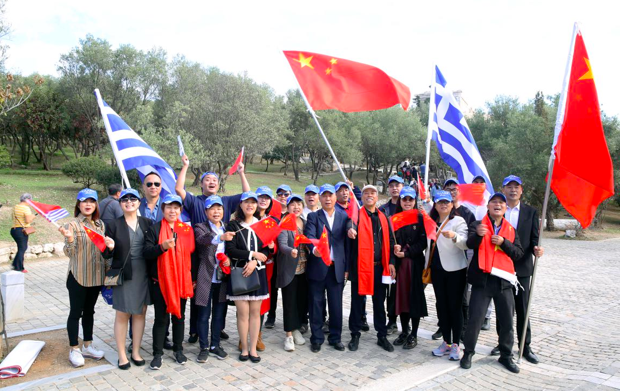
By People’s Daily
The two ancient civilizations of China and Greece enjoy a well-established and long history of friendly exchanges. Leaders of the two countries pay great attention to promoting mutual learning through cultural exchanges so as make the two civilizations shine brightly.
With a strong sense of history and responsibility, China and Greece both seek to draw further strength from their time-honored civilizations and serve as a model of dialogue between civilizations.
The Museum of Asian Art of Corfu in Greece houses more than 6,500 pieces of Chinese cultural relics created from Shang Dynasty (around 1600 B.C.-1046 B.C.) to the late Qing Dynasty (1636 A.D.-1912 A.D.). The collection includes pottery ware, porcelain ware, cloisonné works, and lacquer works.
The huge interest of the Greek museum in collecting Chinese cultural relics comes from the similarity between Chinese culture and Greek culture, according to Despina Zernioti, director of the museum.
What’s particularly interesting is that there are many similarities between the contributions made by the two ancient civilizations in history, said Zernioti.
Great ancient civilizations always have much in common. In the splendid long history of the two civilizations, both China and Greece have nurtured philosophers that had profound influences on later generations, left many extraordinary art works made of pottery, copper, and marble, and attached great importance to poetry and music education. The world-renowned classics, the Homeric epics and the “Book of Songs” have been echoing with each other.
The Greeks believe they are close friends with the Chinese living on the Eurasian continent. Chinese President Xi Jinping pointed out that, as two countries with ancient civilizations, China and Greece have both created distinctive civilizations that have profound influences on human civilization, and the people of the two countries admire each other and respect each other.
On Nov.9, 2019, the launching ceremony of a documentary entitled “Harmony in Diversity” aimed at promoting dialogue on civilizations between China and Greece was held in Athens, capital of Greece. The initiator of the project Luo Tong is the granddaughter of Luo Niansheng, a renowned Chinese translator.
Luo Niansheng was the first Chinese studying in Greece. He translated more than 30 Greek classics including ancient Greek literary works, dramas, and philosophical works. Devoting his whole life to introducing ancient Greek culture to China, Luo Niansheng was awarded the highest prize for literature and art by the Academy of Athens.
Luo Niansheng’s son Luo Jinlin started to direct ancient Greek tragic drama “Oedipus the King” in 1986, and later directed more than 10 ancient Greek drama, helping promote Greek drama culture in China.
Today, Luo Niansheng’s granddaughter Luo Tong, receiving the “relay baton” of China-Greece dialogue from her father and grandfather, is promoting Chinese culture in Greece.
On the same day of the launching ceremony of Luo Tong’s documentary, the torch-lighting ceremony of the 2019 Athens Marathon was held in Marathon municipality of Greece. Artemis Ignatiou was the director and choreographer of the ceremony. She participated in the sun-ray ceremony at Olympia in Greece for the 2008 Beijing Olympic Games, and performed dramas in China. Speaking of her stay in China, she said it is the most important moment in her life.
Chinese people are opening their arms to embrace Greek art, said Ignatiou, adding that they are feeling how the Greeks feel, understanding the spirit of ancient Greece, and experiencing the charm of the Olympics.
There are many beautiful stories about the friendly ties between China and Greece, and Greek assistance for China’s large-scale evacuation of Chinese nationals from Libya in 2011 was an unforgettable memory.
Eight years ago, more than 10,000 Chinese were arranged to evacuate Libya by sea because of the unrest in the country. Greek island Crete, which is about 700 kilometers away from the Libyan port of Benghazi, was the most favorable “transit station”.
After the Chinese side decided to evacuate Chinese nationals from Libya and reached out to Greek government, the latter responded immediately and requested major Greek shipping companies to provide help, said a Greek man who then served as an intermediary between Greek shipping companies and front-line Chinese personnel.
The most urgent thing back then was to apply for Schengen visas for Chinese nationals, the man introduced. Taking into account the entry and exit regulations of the EU and the need for evacuation of Chinese nationals, the Greek government reached a consensus with the Chinese side and decided to divide the over 13,000 Chinese nationals into groups of 50.
A list of all the Chinese nationals to be evacuated was made and stamped for entry permission after verification. This was probably the simplest group Schengen visa in the world, the man said.
China and Greece share similar values on international responsibilities, said John Tzoannos, former secretary general of the Ministry for Shipping and Island Policy of Greece and professor at Athens University of Economics and Business.
He stressed that the two countries would never turn a blind eye to any country in trouble, saying that all countries in the world should offer mutual assistance.
The high attention paid by the leaders of China and Greece to the exchanges between the two ancient civilizations has laid a solid foundation for the continuity of bilateral friendly ties, remarked Chrisi Vigilaki, rector of Greece’s University of Aegean.
Vigilaki has been expecting Xi’s visit to Greece for a long time. He said that Xi’s visit will further boost the development of the traditional friendship between China and Greece, spread the friendship to all sectors of exchanges between the two countries, and make the two ancient civilizations shine with new glows.
